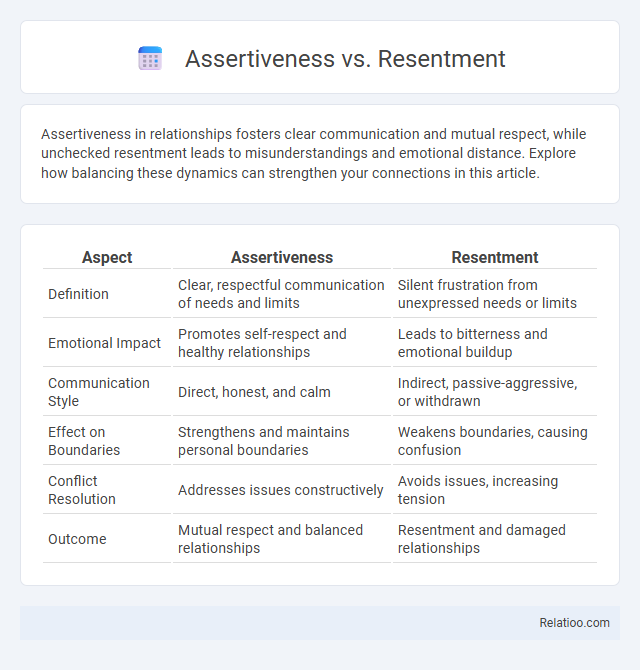Assertiveness in relationships fosters clear communication and mutual respect, while unchecked resentment leads to misunderstandings and emotional distance. Explore how balancing these dynamics can strengthen your connections in this article.
Table of Comparison
| Aspect | Assertiveness | Resentment |
|---|---|---|
| Definition | Clear, respectful communication of needs and limits | Silent frustration from unexpressed needs or limits |
| Emotional Impact | Promotes self-respect and healthy relationships | Leads to bitterness and emotional buildup |
| Communication Style | Direct, honest, and calm | Indirect, passive-aggressive, or withdrawn |
| Effect on Boundaries | Strengthens and maintains personal boundaries | Weakens boundaries, causing confusion |
| Conflict Resolution | Addresses issues constructively | Avoids issues, increasing tension |
| Outcome | Mutual respect and balanced relationships | Resentment and damaged relationships |
Understanding Assertiveness: Definition and Key Traits
Assertiveness is the ability to express your thoughts, feelings, and needs confidently and respectfully without infringing on the rights of others. Key traits include clear communication, self-confidence, and the capacity to establish healthy boundaries, which help prevent feelings of resentment that arise from suppressed emotions or unmet needs. Understanding assertiveness empowers you to maintain balanced relationships while avoiding the pitfalls of passive or aggressive behaviors.
What is Resentment? Signs and Sources
Resentment is a lingering feeling of bitterness or anger caused by perceived unfair treatment or unresolved conflicts, often rooted in past experiences where your boundaries were crossed or your needs neglected. Signs of resentment include persistent irritability, withdrawal from relationships, negative assumptions about others' intentions, and recurring thoughts of injustice. Common sources of resentment are unmet expectations, repeated disrespect, betrayals, and feelings of powerlessness in personal or professional interactions.
The Psychological Impact of Assertiveness
Assertiveness promotes healthy communication by allowing individuals to express their thoughts and feelings confidently without aggression, reducing internalized stress and enhancing self-esteem. In contrast, resentment often stems from suppressed emotions leading to chronic psychological distress, including anxiety and depression. Cultivating assertiveness can prevent the negative mental health effects associated with harboring resentment, fostering emotional resilience and interpersonal balance.
How Resentment Develops in Relationships
Resentment in relationships often develops from unresolved conflicts, unmet expectations, and a lack of clear communication, leading to feelings of frustration and bitterness. When assertiveness is absent, individuals may suppress their true feelings, causing emotional buildup that transforms into resentment over time. Recognizing and addressing these emotions through open dialogue is crucial to preventing long-term relational damage caused by lasting resentment.
Assertiveness vs Resentment: Core Differences
Assertiveness involves expressing your thoughts and feelings confidently and respectfully without violating others' rights, promoting healthy communication and self-respect. Resentment, in contrast, builds from suppressed emotions and unmet needs, leading to bitterness and passive-aggressive behaviors that damage relationships. Understanding the core difference helps you transform negative feelings into constructive dialogue, fostering emotional well-being and stronger connections.
Common Myths About Assertiveness and Resentment
Many people mistakenly believe assertiveness equates to aggression, but true assertiveness involves expressing needs respectfully without infringing on others' rights. Another common myth is that resentment is a justified and passive response to unfair treatment, whereas it actually signals unresolved emotional boundaries that need addressing. Understanding these distinctions helps foster healthier communication and emotional well-being.
Benefits of Practicing Healthy Assertiveness
Practicing healthy assertiveness enhances communication by promoting clear, honest expression of feelings and needs, reducing misunderstandings and conflicts. It fosters self-respect and confidence, helping individuals set boundaries without harboring resentment that can damage relationships. Consistent assertiveness supports emotional well-being by preventing the buildup of negative emotions often associated with passive or aggressive behavior.
Risks and Consequences of Unaddressed Resentment
Unaddressed resentment can lead to chronic stress, damaged relationships, and decreased mental well-being, significantly impacting your personal and professional life. Unlike assertiveness, which fosters clear communication and healthy boundaries, lingering resentment often results in passive-aggressive behavior and emotional withdrawal. Ignoring these feelings increases the risk of long-term psychological issues such as anxiety and depression, undermining your overall resilience and happiness.
Strategies to Shift from Resentment to Assertiveness
Shifting from resentment to assertiveness involves recognizing your feelings and expressing them clearly and respectfully without aggression. You can practice techniques such as setting boundaries, using "I" statements to communicate your needs, and seeking constructive feedback to maintain healthy relationships. Building emotional awareness and confidence empowers you to transform resentment into honest, assertive communication.
Building Long-Term Emotional Wellness Through Assertiveness
Building long-term emotional wellness through assertiveness enhances self-confidence and promotes healthy communication by expressing needs clearly and respectfully. Assertiveness reduces resentment by addressing conflicts early and preventing negative feelings from festering and impacting mental health. Developing assertive skills supports emotional resilience, fostering relationships grounded in mutual understanding and respect.

Infographic: Assertiveness vs Resentment
 relatioo.com
relatioo.com